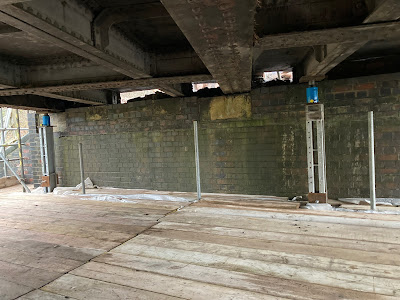3RD JANUARY TO 28TH FEBRUARY 2023
Starting in June 2022, after 6 months of design, drawing, tender documentation and tendering by our volunteer Chartered Engineers, we finally appointed Walsh Construction to do this contract. The road between Gretton and Gotherington had to be completely closed for the entire period and 12 weeks’ notice had to be given to Glos. CC and a fee paid to get the Licence for this!
Work duly started on Tuesday 3rd January 2023 with our own P-way team lifting the track and moving it out of the way.
 |
| Drone view of track removal, by Paul Fuller. |
 |
| Track panels removed, ready for bridge work to start. |
Walsh’s then removed the ballast and stockpiled it for re-use. The next task was to remove the old ¾” asphalt waterproofing which had failed and was leaking.
 |
| Example of deck repair made. |
This then causes corrosion of the 3/8” thick deck plates which rot into holes. These rotten parts have to be cut out and new plates welded in.
In addition we now attach a vertical steel drip at the ends of the deck plates to stop water tracking below the plate by capillary action. In the picture on the right you can see props being placed from below.
On this bridge 6 of the 14 stone bearing blocks supporting the entire bridge steelwork were in poor condition (cracked and worn) and needed replacement. To do that the steelwork had to be supported on heavy duty propping provided and installed by Mabey.
Naturally, the entire area beneath the bridge has to
be provided with a fully boarded scaffolding to enable the work to be
done safely.
The existing ballast retention walls at the ends of the deck were in poor condition, and the end of deck drainage was too shallow. The result of these factors is that the ends of the steelwork constantly get wet causing further corrosion. The wetness also contributes to the failure of the stone bearing blocks. These walls were all exposed and some of the steelwork which needed repairs.
 |
| Enclosed scaffolding for shotblasting (lead paint risk). |
Meanwhile, up at deck level progress was being made
with making good the ballast retention walls. Part of the reason for
their failure is down to the vigorous mechanical tamping which is done
these days. We now provide a concrete wedge at the ends of
the walls to provide additional protection. Notice also the damaged pilaster cap top right.
 |
| Outlet from drain to pit in road. |
The end of deck drainage is then laid just outside this concrete wedge and the pipe is taken down the embankment slope. This drainage not only takes the run-off from the deck but any rainwater falling near the deck helping to eliminate, soft spots.
 |
| Steel deck primer applied. |
With the blast cleaning and painting being completed
the waterproofing of the deck was to be the last task. This also
requires the deck to be blast cleaned and then a bright orange primer is
applied.
This is followed by a white waterproof finish coat.
Whilst the main steelwork was in relatively good condition, with just small local repairs required, the lattice parapets (Left and right) were very poor. We therefore opted to remove them completely and replace them with new, having both a galvanised and a painted finish.
 |
| Protection applied to waterproofed deck. |
The white finish coat is then covered with a rubberised sheet to stop any ballast from damaging the lower coats.
 |
| Contractor spreading new ballast over the bridge, looking south. |
The contractor then replaced the ballast.
 |
| View of completed works, with new parapets and pilaster cap. |
 |
| Malvern view from road level. |
 |
| Cotswolds view, with the road leading to the Prescott Hill climb. |
Finally I attach 2 photos at road level above. Note new low headroom warning signs (provided by Glos C.C. but installed by our contractor). These are now circular (prohibition) instead of triangular (warning).
Last but not least, we have culvert 31 B running under the road, alongside the abutment, and then slewing back onto our land. The wall of this held up the road and the end 1.8m x 230mm was pushed forwards, the fence was collapsing, and the exit for the ditch was blocked. This was all repaired and a new fence installed after the roadside ditch was cleared to try to improve the flow into the roadside ditch.
 |
| Culvert wall pushed outwards |
The work was completed a day early on 27th February 2023.
Sadly, I was unable to visit site during the contract, because of my failed and very painful hip and so supervision of the works was done by Ian Scholey, John Sreeves and Peter Lewis. The photos have all been provided by Ian Scholey.
My hip has now been replaced and I am recovering!! I hope to be fully mobile again by mid April!!
Report by John Balderstone – Structures Engineer. 26.03.2023.













